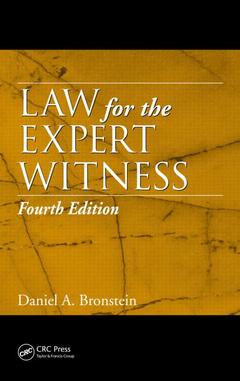Law for the Expert Witness (4th Ed.)
Auteur : Bronstein Daniel A.

Extensively updated and expanded to incorporate legislative and practical changes enacted since the publication of the previous edition, Law for the Expert Witness, Fourth Edition is designed for professionals and students requiring edification on the current processes and techniques of legal procedure.
Drawn from revised versions of the readings assigned to graduate and continuing education courses taught by the author, as well as his own professional experience, the text is divided into four sections. Beginning with procedural issues that an expert witness will encounter in advance of the trial itself, the chapters cover legal paperwork, discovery, depositions and other discovery techniques, and consequences for failure to comply with discovery.
The next section addresses evidentiary issues, exploring fundamental concepts such as burden of proof, presumptions, and admissibility. It defines who is an expert and when one can testify, and describes the proper form of questions to an expert. Next, the book discusses chain of custody issues, exhibits, hearsay, and the best evidence rule.
The book includes suggestions and hints for the expert witness applicable to direct testimony as well as tips on withstanding cross-examination. The final section of the book contains excerpts from the Federal Rules of Civil Procedure and the Federal Rules of Evidence as well as a table of illustrative cases.
New topics in this Fourth Edition include:
- The non-discoverability of the expert?s draft reports, as mandated by FRCP26
- The issue of destruction of evidence as it effects discovery and tests, experiments, and chain of custody
- New and updated information on differing rules among states regarding who is an expert and whether that testimony will be admitted into evidence
- The reissuance of the Federal Rules of Civil Procedure with new subsections
Maintaining the same user-friendly style that made previous editions so popular, this volume enables expert witnesses and attorneys to present compelling evidence in court that will withstand objection from even the most challenging adversary.
Before Trial. Filing Suit, or Legal Paperwork. Discovery in General. Depositions. Other Discovery Techniques. Failure to Cooperate in Discovery. Pretrial Conferences. The Rules of Evidence. Fundamental Concepts. Who Is an Expert and When Can One Testify.The Form of Questions to an Expert. Tests, Experiments, and the Chain of Custody. Common Knowledge and Routine Practice. Real Evidence. Exhibits and Demonstrations. The Rule Against Hearsay. Hearsay Exceptions I: Introduction. Hearsay Exceptions II: Writings and Records. Hearsay Exceptions III: Printed Matter. Hearsay Exceptions IV: Miscellaneous. Best Evidence Rule.A "Real" Case. Suggestions and Hints for Expert Witnesses. Presenting Direct Testimony. Withstanding Cross-Examination. Appendices and Case Listing. Appendix A: Extracts from the Federal Rules of Civil Procedure (in Numerical Order). Appendix B: Extracts from the Federal Rules of Evidence (in Numerical Order). Appendix C: Table of Illustrative Cases. Index.
Daniel A. Bronstein is a professor at Michigan State University where he teaches environmental law in the College of Agriculture and Natural Resources, and medical jurisprudence in the medical schools. He received his bachelor of arts in biophysics from Johns Hopkins University and his bachelor of law from the University of Maryland. After practicing trial law in his native Baltimore for five years, he decided to go into teaching. He received his master of law and doctor of jurisprudential science degrees from the University of Michigan. He has taught at Michigan State University since 1972.
Bronstein was editor of Impact Assessment and Project Appraisal, the refereed journal of the International Association for Impact Assessment, from 1993 to 2000 and is currently a member of its publications committee. He is the author of five books, eleven monographs, and numerous journal articles, and is admitted to the practice of law in both Maryland and Michigan. He is an ex-officio member of the council of Section K of the American Association for the Advancement of Science and has served as chair of the Committee on Environmental Law and as a vice chair of the Committee on Scientific Evidence of the American Bar Association
Date de parution : 01-2012
15.6x23.4 cm
Thèmes de Law for the Expert Witness :
Mots-clés :
Pretrial Conference; Hearsay Rule; expert witness; Held; trial; FRE; attorney; FRE Rule; testimony; Hearsay Exceptions; evidence; Judicial Notice; Expert Testimony; Excited Utterance; Pretrial Order; Unfair Prejudice; GCR; FRCP Rule; Swine Flu Immunization; Follow; Narrative Testimony; Plaintiff’s Expert Witnesses; Ford Motor Company; Federal Rules; Confer; Lay Witnesses; Routine Practice; North; Business Records Exception



